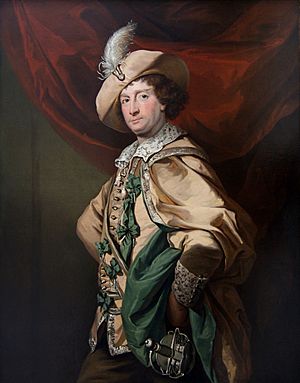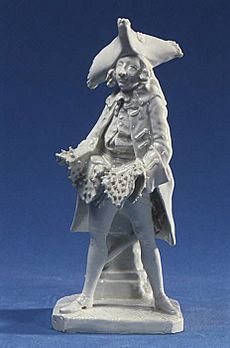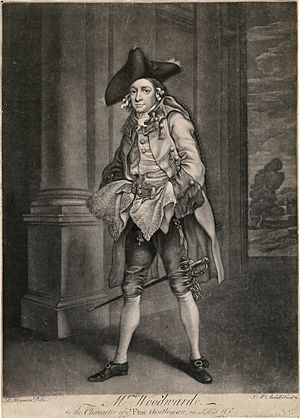Henry Woodward (English actor) facts for kids
Henry Woodward (born October 2, 1714 – died April 17, 1777) was a famous English actor. He was best known for his amazing performances in funny plays, called comedies, during his time.
Contents
Early Life and First Steps on Stage
Henry Woodward was born in London. His father made and sold candles, and Henry was expected to follow in his footsteps. He went to Merchant Taylors' School from 1724 to 1728.
When his father's business failed, young Henry joined a group of actors led by John Rich. Rich was also known by his stage name, "Lun." In January 1729, Henry performed in a popular play called The Beggar's Opera. He played two small roles, the Beggar and Ben Budge. Henry loved being on stage and stayed with Rich, who taught him how to play different characters, including the funny harlequin.
From 1730 to 1736, Henry acted at the Goodman's Fields Theatre. After this, the acting group moved to another theatre. In 1737, Henry appeared as Harlequin Macheath in a show he helped create, called The Beggars' Pantomime.
Becoming a Star at Drury Lane
In 1737, Henry Woodward moved to the famous Drury Lane Theatre. He stayed there for ten years, until 1747. During this time, he played many different roles in comedies. He added about 50 new characters to his list of performances!
Later, in September 1747, Henry went to Dublin, Ireland. He performed at the Smock Alley Theatre as Marplot in a play called The Busie Body. He returned to Drury Lane in 1748 and continued to be very popular.
Between 1751 and 1756, Henry also created and acted in several of his own funny pantomimes. These shows were very popular because they were well-made and creative. One of his plays, Marplot in Lisbon, was shown at Drury Lane in 1754.
Henry stayed at Drury Lane until 1758. He was a very important actor there, often working closely with another famous actor, David Garrick. Many people thought Henry was the best at comedy. When he played Mercutio in Romeo and Juliet, audiences loved him. A writer named Arthur Murphy said that "no actor ever reached the vivacity of Woodward," meaning no one was as lively as him. Another person, Tate Wilkinson, called his performance as Bobadill in Every Man In His Humour "wonderful."
New Adventures in Dublin
Henry decided to leave Drury Lane because he received an exciting offer from another actor, Spranger Barry. Barry wanted to open a new theatre in Dublin. Henry had saved a lot of money, about £6,000, and decided to invest in the new theatre.
In October 1758, the Crow Street Theatre opened in Dublin. Henry helped manage it. However, managing the theatre was not easy, and by 1762, Henry had lost half of his savings. He and Barry had disagreements, and their partnership ended. Henry then returned to London.
Back to London and Final Performances
In October 1763, Henry Woodward returned to London and began acting at the Covent Garden Theatre. He performed many of the roles he had played in Ireland. He also traveled to Edinburgh and York to perform.
In 1771, he was the first actor to play Sir Christopher Cripple in a new play called The Maid of Bath. He continued to act at Covent Garden. His very last performance was in January 1777, when he played Stephano in The Tempest.
Henry Woodward passed away on April 17, 1777, at his home in London. He was buried at St George's, Hanover Square. After his wife passed away, Woodward lived with George Anne Bellamy for his last ten years. He left most of his money to her, but she never received it.
 | Leon Lynch |
 | Milton P. Webster |
 | Ferdinand Smith |




